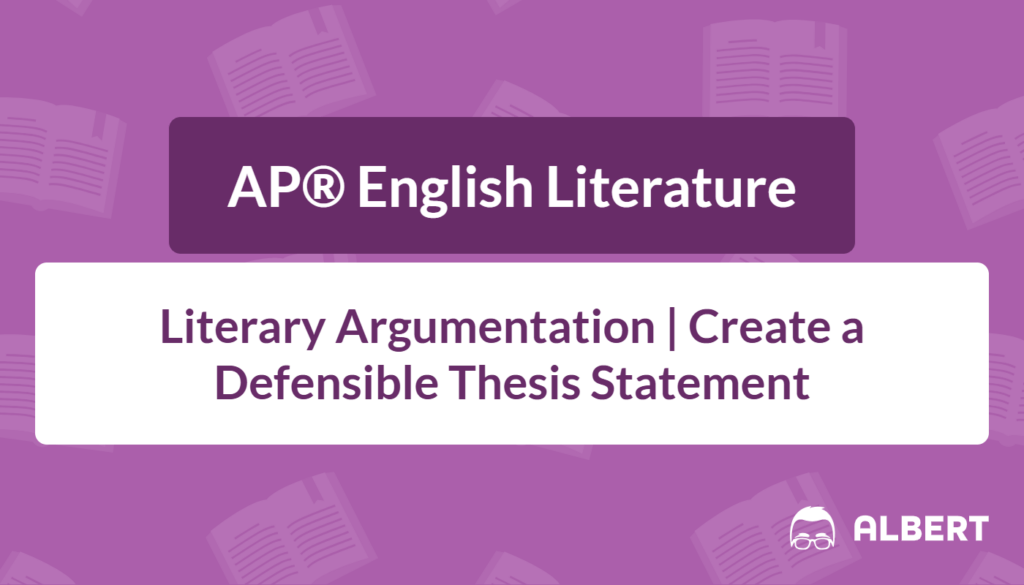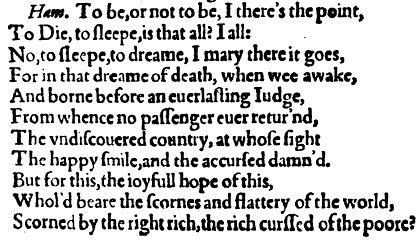What We Review
How to Write a Defensible Thesis Statement for Literary Argumentation
Having a thesis statement that clearly expresses a claim about a literary work is crucial for strong AP® Lit essays. This central idea guides each paragraph and shows how textual details fit together. Without it, readers may find your literary analysis confusing, and your grade could suffer. However, learning how to write a thesis statement is essential, as crafting a powerful thesis involves more than just stating a topic. It requires clarity, arguability, and evidence-based reasoning.
Below is a step-by-step guide on how to write a thesis statement that is both defensible and grounded in a careful reading of the text. Along the way, you will see how these principles apply to well-known works frequently taught in AP® Literature classes.
Understanding the Thesis Statement
A thesis statement is a concise sentence (or two) that asserts your interpretation of a text. It should form the foundation for all subsequent paragraphs in an essay. Rather than summarizing the plot, it presents a meaningful claim about the text’s deeper significance. Therefore, it should go beyond simple fact to prove why your reading offers insight into important themes, character motivations, or structural choices.
Consider an example from F. Scott Fitzgerald’s novel, The Great Gatsby. If you write, “Gatsby throws lavish parties,” that is a factual observation. It states something anyone could see. However, a more compelling and arguable take might be: “Gatsby’s opulent parties symbolize his unattainable yearning for the American Dream, highlighting how illusions of success distract him from genuine human connection.” Notice how this statement interprets the parties, invites debate, and connects directly to the novel’s broader themes.
Why a Defensible Thesis Statement Matters
A defensible claim implies that your thesis can be supported by textual details. At the same time, it invites possible counterarguments. This element of debate is what makes literary argumentation compelling and academically rigorous.
In Shakespeare’s Hamlet, for instance, one might argue that Hamlet’s “To be, or not to be” speech reflects moral indecision. Another interpretation might focus on existential themes or a critique of revenge. Both viewpoints are defensible, as Shakespeare’s language can support multiple layers of meaning. However, a statement like “Hamlet is unsure about making decisions” is too broad and factual. A more defensible thesis might be: “Hamlet’s soliloquies reveal an inner struggle between his sense of justice and his dread of moral failure, exposing his uncertainty as symptomatic of a broader existential crisis in the play.”
By presenting a viewpoint that invites evidence, your thesis helps you organize your essay’s paragraphs, ensuring each piece of text you discuss builds toward explaining or supporting your argument.
Steps to Identify and Develop a Defensible Thesis Statement
Step 1: Understand the Text
Before drafting any thesis, spend time analyzing literary elements like theme, character, symbolism, and structure. This process ensures you grasp the text well enough to offer a unique perspective.
- Look for recurring images or motifs.
- Note any conflicts—whether internal (character vs. self) or external (character vs. society).
- Highlight key lines that resonate with the text’s possible messages.
For example, when analyzing The Great Gatsby, pay attention to the green light that Gatsby watches from across the bay. What does this glowing beacon represent? How does Fitzgerald’s language create a sense of longing or hope? By noticing such details, you gather clues that guide you toward a potential thesis.
Detailed Example: Consider the conflict between Gatsby’s idealized love and the reality of Daisy’s life with Tom. A short but telling line from the novel is Nick’s observation, “Gatsby believed in the green light.” This single sentence suggests Gatsby’s unwavering faith in an elusive dream. Notice how the text frames Gatsby’s hope as almost mythical, tying it to the broader theme of chasing the American Dream. By analyzing the language around this light, you can build an argument about illusion versus reality.
Step 2: Formulate Your Interpretation
Next, transform your observations into a prenatal version of your thesis. Rather than merely listing observations, connect them under one interpretive umbrella. Ask yourself, “So what?” or “What is Fitzgerald (or the author) saying about human nature, society, or identity?”
- Start by reviewing your notes.
- Select the element that seems most significant, such as frustrated dreams, sacrificial ambition, or moral decay.
- Formulate an interpretive statement.
A possible initial idea about Gatsby might be: “Gatsby’s pursuit of Daisy represents a longing for a past that never truly existed.” This statement gives direction. However, you can sharpen it to make it more arguable: “Gatsby’s relentless pursuit of Daisy symbolizes his disillusionment with the American Dream, highlighting how the past becomes an impossible ideal that blinds him to the novel’s corrupt social reality.”
By moving from a general idea to a statement that connects to broader themes, you create a foundation that is more specific and more debatable.
Step 3: Make It Arguable
A claim becomes arguable when it expressly states a viewpoint that supported evidence can confirm or refute. You want a statement nuanced enough to allow for discussion, rather than a simple statement of fact.
- Assess whether your thesis offers a position someone could disagree with.
- If it feels too obvious, add complexity by focusing on an underlying theme or motivation.
- Use language that signals an interpretation, such as “suggests,” “reveals,” or “indicates.”
For instance, if you say, “Gatsby’s parties are large and expensive,” no one can disagree. Instead, argue, “Gatsby’s lavish parties emphasize how material displays of wealth fail to remedy the loneliness that haunts him, indicating a deeper critique of the Jazz Age’s hollow pursuits.” Now, readers can debate whether the parties truly symbolize that emptiness or if they serve additional purposes in Fitzgerald’s portrayal of the era.
Step 4: Provide Evidence
While the thesis statement itself is generally concise, it also sets up how you intend to prove or illustrate your point. Briefly plan out which textual details or literary devices support your claim.
- Make a quick list of events, character interactions, or lyrical descriptions that match your thesis.
- Note any direct quotes that strongly reinforce your interpretation.
- Indicate how each piece of evidence ties back to the main point.
Returning to Gatsby:
- The constant references to luxury and color at his gatherings (e.g., “blue gardens,” “glistening hors-d’oeuvre plates”) show a certain enchantment.
- Quotes showcasing Nick’s admiration mixed with moral discomfort help depict the era’s contrasts.
Each reference you gather from the text then becomes a stepping stone in your essay, guiding readers through the logic behind your claim.
Example of Crafting a Thesis Statement
Below is a simple outline showing how one might move from an initial idea to a polished, defensible claim:
- Start with a Common Theme:
- “In The Great Gatsby, the notion of the American Dream emerges frequently.”
- Develop a Claim About That Theme:
- “The American Dream revolves around wealth and social status, but it masks a deep disillusionment.”
- Refine for Clarity and Arguability:
- “In The Great Gatsby, Fitzgerald contends that the endless pursuit of the American Dream, personified by Gatsby’s longing for Daisy, ultimately leads to moral and emotional decay, exposing the emptiness behind society’s glamorous façade.”
Notice how the final thesis statement connects a specific character (Gatsby), a broader theme (the American Dream), and an evaluative judgment (moral and emotional decay). Each piece of evidence in your paper would then illustrate how or why this viewpoint holds true.
Quick Reference Guide to Key Vocabulary
Below is a brief chart of important terms and their definitions. Use this as a quick reminder while preparing to write or revise your thesis statements:
| Term | Definition |
| Thesis Statement | A concise, arguable claim that expresses the writer’s interpretation of a literary work. |
| Defensible Claim | An assertion that can be debated and supported by textual evidence. |
| Literary Analysis | The process of examining elements of a text—such as theme, character, symbolism—to discover deeper meaning. |
| Interpretation | The specific understanding or perspective a reader forms about what the text communicates. |
| Evidence | Quotations, descriptions of literary devices, and textual details that support an argument. |
| Arguability | The quality of inviting disagreement or various viewpoints, making an argument more engaging. |
Conclusion
A defensible thesis statement is the backbone of any strong literary argument. It allows you to map out how each part of the text supports or challenges your view. By clearly stating your interpretation, narrowing your focus, and preparing specific evidence, you will ensure that your literary analysis aligns with the demands of the AP® Lit exam. This skill applies to any genre—short fiction, poetry, longer fiction, or drama—because the principles of debate, evidence, and clarity remain consistent. Above all, a thesis that stands up to close reading and counterarguments will help you craft essays that truly engage readers and earn higher scores.
Sharpen Your Skills for AP® English Literature and Composition
Are you preparing for the AP® English Literature and Composition test? We’ve got you covered! Try our review articles designed to help you confidently tackle real-world AP® English Literature and Composition problems. You’ll find everything you need to succeed, from quick tips to detailed strategies. Start exploring now!
- AP® English Literature: Claim and Evidence
- AP® English Literature: Commentary and Reasoning
- AP® English Literature: Textual Evidence
- AP® English Literature: Elements of Composition
Need help preparing for your AP® English Literature and Composition exam?
Albert has hundreds of AP® English Literature and Composition practice questions, free response, and full-length practice tests to try out.









